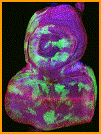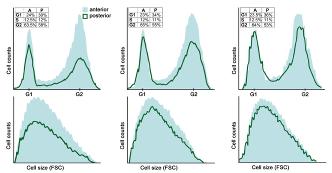




|
Research |


|
Molecular signalling pathways allow cells to communicate with each and are critical for normal growth and development of multi-cellular organisms. Inappropriate cell signalling is associated with developmental disorders and cancer, a disease characterised by deregulated proliferation, survival and spread of affected cells |

|
Research
|
|
Intracellular signalling & growth control |
|
Intracellular signalling & growth control |
|
This work is funded by: |
|
Home Research People Publications News Contact us |

|
Cell signalling and Development in Drosophila |
|
Bennett Lab |
|
throughout the body. We know that phosphatases can limit inappropriate signalling (e.g. Bennett & Alphey 2002), but in many instances their precise roles in restricting cell growth, survival and migration are not fully understood. We have identified a number of multivalent adapter proteins that appear to mediate PP1’s effect on cellular growth and proliferation, adhesion and/or motility during Drosophlia development. We are using a multidisciplinary approach, involving genetics, cell biology and biochemistry, to understand the function of these complexes and the role of PP1 within them. .
|
|
Using advanced genetic techniques, we can examine the effects of multiple genetic alterations on populations of cells alongside phenotypically normal cells, recapitulating the events that take place during the growth of cancerous cells in otherwise healthy tissues and organs in humans. Measurement of a number of different parameters can be made on cell populations with different genetic backgrounds, e.g. cell cycle phasing on fluorescently labelled cells from dissociated tissues (left ). |

